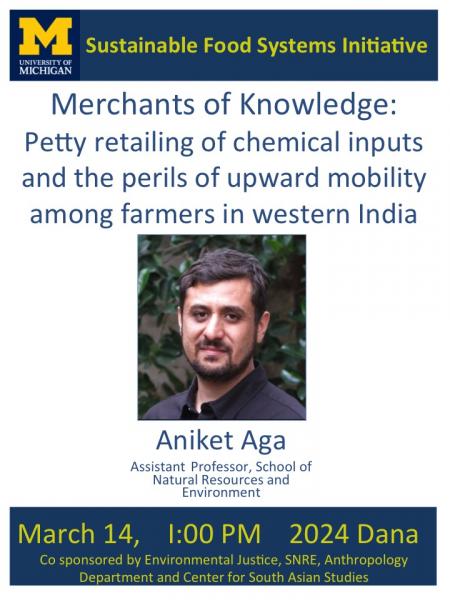Merchants of Knowledge: Petty retailing of chemical inputs and the perils of upward mobility among farmers in western India
Aniket Aga, Assistant Professor, UM School of Natural Resources and Environment
The popularity of hybrids, GM seeds, synthetic pesticides etc. are frequently indexed through their sales figures, yet studies of the everyday transactions through which farmers purchase agri-inputs are rare. This talk provides an account of the everyday relationship of farmers with transnational and domestic agribusiness capital, by focusing on the figure of the village-level petty retailer of chemical inputs. Retailers are those who provision farmers with seeds, fertilizers, pesticides, and other chemicals, manufactured by companies like Monsanto and Syngenta. They thus constitute the bottom-most rung of the agribusiness supply chain. The talk traces the rise of such village-level retailers in western Maharashtra, India, since the 1990s, and finds that Maratha (a dominant land-holding caste) farmers have ventured into retailing, as their first foray into entrepreneurship. From the sale of seeds and chemical inputs, to the extension of credit, and the marketing of harvest, the talk details how retailers mediate virtually all steps of farming. Ultimately, the talk argues that the entry of Marathas into petty retail represents a precarious attempt at upward mobility, troubling the capital/farmers opposition in the literature on corporate food regimes and food sovereignty.
Co sponsored by Environmental Justice, SNRE, Anthropology Department and Center for South Asian Studies
Co sponsored by Environmental Justice, SNRE, Anthropology Department and Center for South Asian Studies
| Building: | Dana Natural Resources Building |
|---|---|
| Event Type: | Lecture / Discussion |
| Tags: | Anthropology, Asia, Environment, India |
| Source: | Happening @ Michigan from Center for South Asian Studies, School for Environment & Sustainability, International Institute, Asian Languages and Cultures, UM Sustainable Food Systems Initiative, Department of Anthropology |


